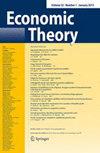Persuasion with ambiguous receiver preferences
IF 1.1
3区 经济学
Q3 ECONOMICS
引用次数: 1
Abstract
Abstract I describe a Bayesian persuasion problem where Receiver has a private type representing a cutoff for choosing Sender’s preferred action, and Sender has maxmin preferences over all Receiver type distributions with known mean and bounds. This problem can be represented as a zero-sum game where Sender chooses a distribution of posterior mean beliefs that is a mean-preserving contraction of the prior over states, and an adversarial Nature chooses a Receiver type distribution with the known mean; the player with the higher realization from their chosen distribution wins. I formalize the connection between maxmin persuasion and similar games used to model political spending, all-pay auctions, and competitive persuasion. In both a standard binary-state setting and a new continuous-state setting, Sender optimally linearizes the prior distribution over states to create a distribution of posterior means that is uniform on a known interval with an atom at the lower bound of its support.具有模糊接收者偏好的说服
我描述了一个贝叶斯说服问题,其中接收者有一个私有类型,表示选择发送方首选动作的截止,并且发送方在所有具有已知均值和界的接收者类型分布中具有最大偏好。这个问题可以表示为一个零和游戏,发送者选择后验均值信念的分布,这是先验状态的均值保持收缩,而对抗者选择具有已知均值的接收者类型分布;从他们所选择的分销中获得更高实现的玩家获胜。我将最大化说服与用于模拟政治支出、全付费拍卖和竞争性说服的类似游戏之间的联系形式化。在标准的二元状态设置和新的连续状态设置中,Sender对状态的先验分布进行最佳线性化,以创建一个后验均值分布,该分布在已知区间内均匀,原子位于其支持的下界。
本文章由计算机程序翻译,如有差异,请以英文原文为准。
求助全文
约1分钟内获得全文
求助全文
来源期刊

Economic Theory
ECONOMICS-
CiteScore
2.50
自引率
23.10%
发文量
68
期刊介绍:
The purpose of Economic Theory is to provide an outlet for research - in all areas of economics based on rigorous theoretical reasoning, and
- on specific topics in mathematics which is motivated by the analysis of economic problems. Economic Theory''s scope encompasses - but is not limited to - the following fields. - classical and modern equilibrium theory
- cooperative and non-cooperative game theory
- macroeconomics
- social choice and welfare
- uncertainty and information, intertemporal economics (including dynamical systems)
- public economics
- international and developmental economics
- financial economics, money and banking
- industrial organization Economic Theory also publishes surveys if they clearly picture the basic ideas at work in some areas, the essential technical apparatus which is used and the central questions which remain open. The development of a productive dialectic between stylized facts and abstract formulations requires that economic relevance be at the forefront. Thus, correct, and innovative, mathematical analysis is not enough; it must be motivated by - and contribute to - the understanding of substantive economic problems.
Officially cited as: Econ Theory
 求助内容:
求助内容: 应助结果提醒方式:
应助结果提醒方式:


